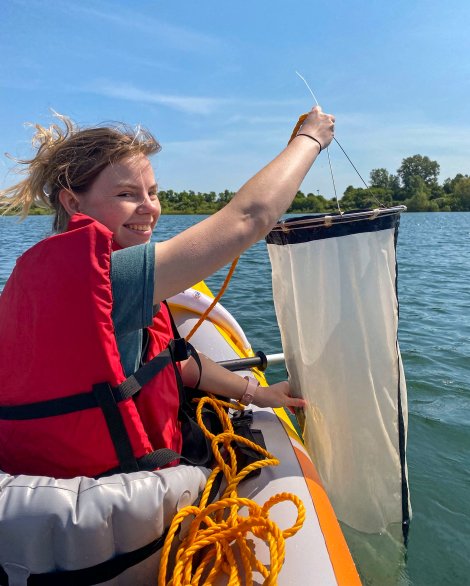
Ecotoxicology Investigation
Ohio Wesleyan Students Explore How Species Responds to Salt Pollution
Name: Makenna Juergens ’23
Hometown: Springfield, Ohio
Major: Pre-Professional Zoology
Minors: Chemistry and Psychology
OWU Connection Experience: Summer Science Research Program
Juergens and Abby Doza ’23 of Plain City, Ohio, are participating in Ohio Wesleyan’s annual 10-week Summer Science Research Program. They are completing a project titled “Exploring Local and Regional Variation in NaCl tolerance in Daphnia pulicaria,” or water fleas, under the mentorship of Amy Downing, Ph.D., professor of Zoology in OWU’s Department of Biological Sciences.
Earlier this year, Downing was among a group of international researchers publishing a study about salt pollution in freshwater environments in the Proceedings of the National Academy of Sciences journal.
What We’re Researching
“We are researching the effects of NaCl (salt) on freshwater ecosystems. Human activity, such as farming and road deicing, can add excess salt into freshwater streams, ponds, and lakes. This can cause adverse effects on the species living in these environments.
“Daphnia are commonly used in ecotoxicology studies, as they are good indicators of ecosystem health. We’re trying to figure out if Daphnia have adapted to become more tolerant of higher levels of salt in water. This information can be used to further sustainability efforts in areas such as trying to lower the EPA’s limit for how much road salt can be used during the winter, and how we go about dealing with agricultural runoff.”
My Favorite Moments
“My favorite part of working in the lab this summer has been working in the field. As cool as it is to see the Daphnia up close under the microscope, going out in the kayak and collecting from the ponds is the best part. Out in the field, we also get to come in contact with the other species that live near and in the ponds, such as fish, turtles, and frogs!”
Lessons Learned
“The thing I think I will take away from this is how actually fun it is to be in the lab. I’ve never been a huge fan of lab work, but as someone planning to get her Ph.D., lab work is a pivotal part of that process.
“This summer has shown me that research can be really fun, even when your entire day is spent bent over a microscope trying to dissect a 1-millimeter-long organism trying to determine its species.”
Why I Chose Ohio Wesleyan
“I chose to attend OWU because of the campus size, and also the faculty I met during my campus visits. Shout out to Dr. (Shala) Hankison who let me sit in on her animal behavior class during the polar vortex — speaking to her that day and seeing her teach really solidified my plans to attend OWU.”
My Plans After Graduation
“After graduation, I plan to go to graduate school to get my Ph.D. OWU’s faculty have been a key part in preparing me for applications — professors are helping me figure out what programs would be the best for me, and Danielle Bailey, who works in the Career Connection office, has helped me with application materials like my resume, CV, and writing samples.”
